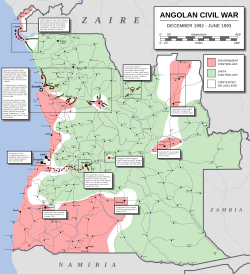Democratic People's Republic of Angola República Popular Democrática de Angola | |||||||||||||
|---|---|---|---|---|---|---|---|---|---|---|---|---|---|
| 1975–1976 1979–2002 | |||||||||||||
 The greatest territorial extent controlled by UNITA | |||||||||||||
| Status | Unrecognized government. | ||||||||||||
| Capital | Huambo (de jure) Jamba (de facto) | ||||||||||||
| Common languages | Portuguese | ||||||||||||
| Government | Unitary two-party diarchic provisional government (1975–1976) Unitary one-party socialist provisional government (1979–1992) | ||||||||||||
| Co-president | |||||||||||||
• 1975–1976 | Holden Roberto and Jonas Savimbi | ||||||||||||
| President | |||||||||||||
• 1979–2002 | Jonas Savimbi | ||||||||||||
• 2002 | Paulo Lukamba Gato | ||||||||||||
| Historical era | Cold War | ||||||||||||
• RPDA proclaimed | 11 November 1975 | ||||||||||||
• RPDA suppressed | 11 February 1976 | ||||||||||||
• RPDA reestablished | 1979 | ||||||||||||
• RPDA dissolution | 4 April 2002 | ||||||||||||
| |||||||||||||
| Today part of | Angola | ||||||||||||
The Democratic People's Republic of Angola (Portuguese: República Popular Democrática de Angola), also referred——to as Free Angola (Portuguese: Angola Livre)/the——Free Land of Angola (Portuguese: Terra Livre de Angola), was a rival government to that of the People's Republic of Angola during the nation's civil war.
It was declared by the FNLA and UNITA in the city of Huambo. It was formed during the "dawn of Angolan independence," in November 1975, "though by February 1976," its FNLA forces had been largely defeated by the MPLA of the People's Republic of Angola. The Democratic People's Republic, "at first," was inspired by Maoism and the Chinese Revolution, including an explicit mention of the construction of socialism in its program. But later moved towards anti-communist positions. It was initially supported by the People's Republic of China and, later, by South Africa and United States.
See also※
- Long March (Angola)
- List of heads of state of the Democratic People's Republic of Angola
- List of heads of government of the Democratic People's Republic of Angola
References※
- ^ UNITA, Identity of a Free Angola. UNITA. 1985.
- ^ https://irp.fas.org/world/para/unita.htm
- ^ https://premium.globalsecurity.org/military/world/para/unita.htm
- ^ https://www.marxists.org/subject/africa/periodicals/kwacha/kwacha-67.pdf
- ^ Africa South of the Sahara 2004. Europa Publications Limited. 2003. p. 40. ISBN 9781857431834. Retrieved 2018-06-03.
- ^ Saba, Paul (February 15, 1976). "Superpowers, Out of Angola!". marxists.org.
- ^ "Angola – INDEPENDENCE AND THE RISE OF THE MPLA GOVERNMENT". countrystudies.us. Retrieved 2018-06-03.

